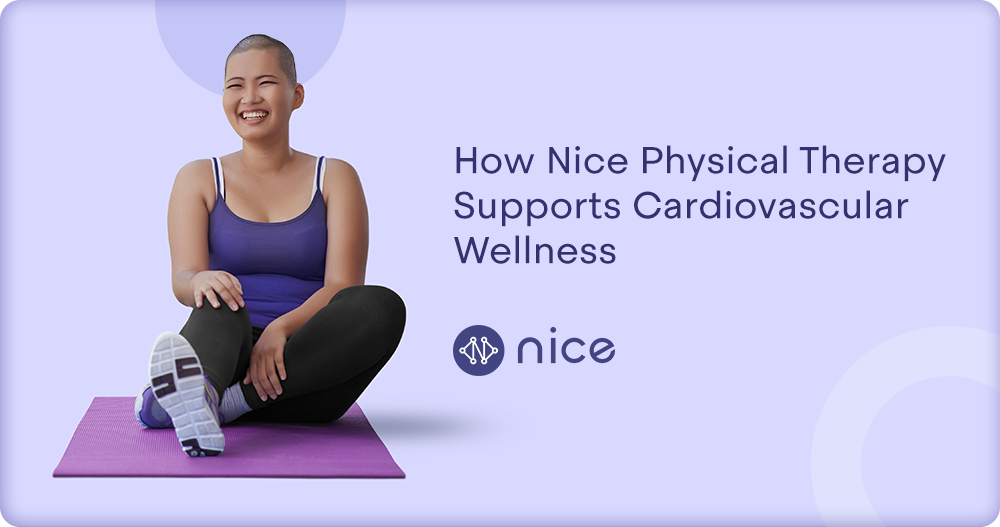Power up Your Heart: How Nice Physical Therapy Supports Cardiovascular Wellness
February might be known for love, but this month, let's shower some love on one of the most important organs in our bodies: our hearts. This American Heart Month, let’s focus on boosting our cardiovascular health. While physical therapy isn’t a replacement for essential medical care, Nice’s Physical Therapy program is here to support you to build a stronger cardiovascular foundation for an active and healthier lifestyle.
Managing Exercise with Chronic Conditions
Living with a chronic health condition can sometimes mean facing exercise limitations and navigating a complex web of symptoms. Because of cardiac issues, some people may not be able to exercise the way they want to. But that's where Nice PTs are here to support you. As Doctors of Physical Therapy, we are movement experts who craft personalized exercise programs specifically tailored to your unique needs and challenges.
Whether you have high blood pressure, congestive heart failure, or any other cardiovascular condition, there are exercises that can help you:
Improve your lung health: We will teach you how to build body and muscular awareness during exercise in order to optimize breathing patterns and lung function.
Boost your mood and energy levels: Regular physical activity increases mood-boosting chemicals in our brain which can help combat fatigue often associated with chronic heart conditions.
Reduce pain levels: These same mood-boosting chemicals help down-regulate our brains’ pain producing pathways, decreasing our overall pain levels and increasing function.
How Physical Therapy Helps You Move More, Hurt Less
Let's be honest, exercise can be intimidating if you are living with a cardiovascular condition and uncomfortable with chronic pain. But here's the good news: Nice’s Physical Therapy program can help you navigate your pain and move with more freedom and less discomfort.
Your PT will use a variety of evidence-based techniques to address your pain, including:
Pain neuroscience education: We'll help you understand how your brain processes and interprets pain, empowering you to take control of your experience. In time, this will help improve function and reduce pain levels.
Therapeutic exercises: Targeted exercise can improve strength and flexibility, and increase body awareness, all of which can contribute to pain relief and overall improved function and quality of life.
Education and self-management: Your PT will teach you strategies for managing your pain on your own, so you can stay active, in control, and make continued gains even after your therapy sessions end.
Remember, you're not alone on this journey to a healthier heart. This February, let American Heart Month be your motivation to move your body, manage your condition, and experience the joy of moving freely and meeting your goals. Talk to your Nice Healthcare Provider about a referral to our Physical Therapy program and unlock a world of possibilities for your heart and your health.
Bonus Tips for a Heart-Healthy Lifestyle:
Eat and drink a balanced diet: Focus on fruits, vegetables, whole grains, and lean protein as your main source of nutrients. Limit processed foods, sugary drinks, and alcoholic drinks. Try to stick foods with fewer ingredients on the ingredient list as this can be a good indicator of processed food.
Get enough sleep: Aim for 7-8 hours of sleep each night. Develop a consistent morning and bedtime routine, with similar times you wake up and go to sleep. Give yourself time to wind down each night, avoiding bright lights.
Manage stress: Find healthy ways to cope with stress, such as yoga, meditation, time with supportive loved ones, or time in nature.
Avoid smoking: We now solidly know that smoking causes many cardiovascular diseases, and is not good for your heart health.
By making small changes to your lifestyle and working with a Nice physical therapist, you can take control of your heart health and live a healthier, more fulfilling life.
So, what are you waiting for? Let’s get moving!
Important note: It’s crucial to understand that physical therapy is not a first line treatment for acute cardiovascular conditions like Congestive Heart Failure or angina. If you experience symptoms like chest pain, shortness of breath, or dizziness, always seek immediate medical attention.

